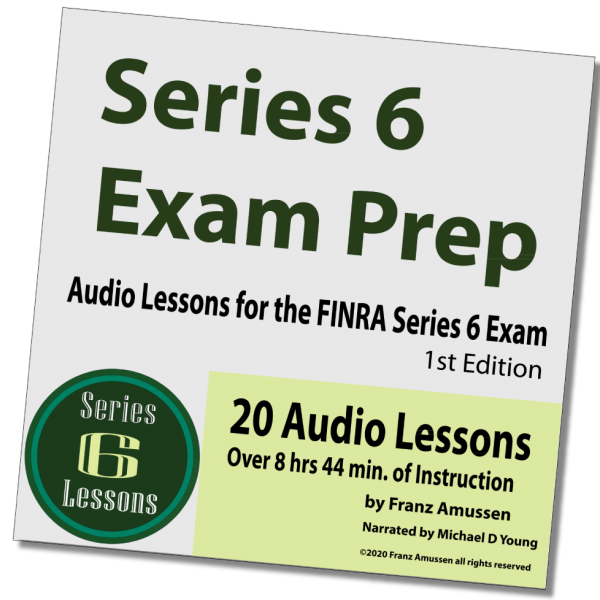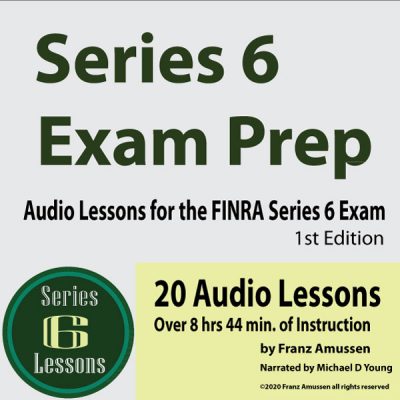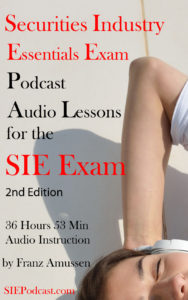Series 6 Lesson 16 Communications
Series 6 Lesson 16 Communications is the topic of this lesson. Communications with the public have to be approved/monitored by a principal and copies have to be kept. Communication to retail investors have to be pre-approved and copies have to kept, but also, they have to be filed with FINRA.
Correspondence is any written/electronic communication that is made available to 25 or fewer retail investors within a 30-day period. It does not have to be pre-approved or filed with FINRA.
Institutional communications are those only made available to institutional investors.
Retail communications are those made available to more than 25 retail investors in a 30-day period.
When you file copies of communications with FINRA, you have to provide the date of first use, the name, title, and CRD number of the principal approving it, and the date the approval was given.
Communications about variable contracts have even more standards applied to them. The customer has to understand that they are being offered variable life insurance, regardless of what the official title of the product is, and not a mutual fund, and that it does not have good short-term liquidity. The tax ramifications also have be to fully explained to the customer.
FINRA stipulates that mutual funds can only use fund rankings in their communications if they were issued by an official ranking entity that does not have a conflict of interest. These include Lippers, Barron’s and Zacks Investment Research. If you have a ranking from an official source, you still have to use all of the usual disclaimers and disclose the source of the ranking data. You also have to explaining the rating system, such as stars or something similar.
Bonds are also rated according to their volatility, and this can be disclosed as well as long as you include a prospectus along with the sales literature.
Some firms use investment analysis tools, programs that are meant to simulate future results. These are only meant as predictions and may or may not come true. If these results are used, you have to disclose the criteria and methods used, including the limits of the tool. That results must vary with each user and that the results are hypothetical.
Under FINRA rules, you will need to notify your employer of any work you are doing outside the firm. This is to help make sure there are no conflicts of interest. FINRA wants to supervise all the activities of its registered representatives.
Selling away means that you engage in a transaction even after you were told that it was not approved by your employer.
FINRA and the SEC accommodate those who are called away for military service. While they are away, their license is placed on inactive status. Their continuing education requirements are waived, along with their dues and assessments. The two-year expiration period does not apply. They can still earn commissions but cannot perform any duties of a registered representative while on inactive status.
If you are telemarketing, you will need to abide by certain rules.
Never call before 8 a.m. or after 9 p.m. in a person’s local time zone unless you have express permission.
Check any established “do-not-call” lists, including the firm’s and that FTC’s
You have to disclose your purpose, your employer, and your company’s contact information.
You must honor people’s requests to be put on the do-not-call list.
If any of your employees have previously worked for a disciplined firm, who was busted by the SEC or something similar, you are required to record and store their conversations for up to three years.
When filling out a new account form, a person will be asked if they are associated with a member firm. If they are, your firm has to notify the person’s employer that you are opening up the account. The employer can also request copies of confirmations, statements, and other pertinent information.
Series 6 Lesson 16 Communications
We also offer lessons for:
The Series 7 Exam
https://gumroad.com/l/ILYu
The Series 22 Exam
https://series6lessons.com/series-22-exam/
The Series 63 Exam
https://series6lessons.com/series-63-exam-lessons/
The Life Health Insurance Exam
https://series6lessons.com/insurance-lessons/
The SIE Exam (Securities Industries Essentials Exam)
https://series6lessons.com/finra-sie/
Click on any of them to find out more
Podcast: Play in new window | Download (Duration: 10:52 — 4.5MB)
Subscribe: Apple Podcasts | RSS | Subscribe to Podcast




